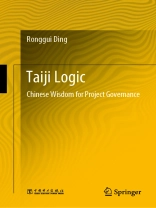This book illustrates the Chinese wisdom hidden behind the project governance which is called “Taiji logic”.
“Taiji logic” is a set of dialectical ideals and approaches that are unique in the Chinese culture. The three pillars of “Taiji logic” are: identifying the conflicts based on the principle that Yin – Yang are not only opposite but also unitary, capturing the best time to reconcile conflicts with the laws of transformations of Yin – Yang, and finally, symphonizing conflicts with “Zhong-Yong” ideas to balance the needs of various stakeholders. This book aims to solve key issues in project governance from a special Chinese perspective: What is the essence of “Taiji logic”? How should one identify the major conflicts across various phases of project governance and the best time to reconcile them? What are the essential forces that help one to reconcile major conflicts? The fusion and collision of various cultures has made our world full of variety and conflicts. “Taiji logic” offers philosophical ideas and practical approaches to reconcile conflicts in project management.
Innehållsförteckning
Chapter 1 Taiji logic used to deal with management contradictions.- Chapter 2 Project value is always associated with contradictions.- Chapter 3 Project opportunities derived from the interactions between internal and external contradictions.- Chapter 4 Balancing the public interests and private interests of
project stakeholders.- Chapter 5 It is crucial to develop the project governance platform.- Chapter 9 Avoiding weaknesses associated with the Taiji logic.
Om författaren
Ronggui Ding, Ph D in system engineering, Professor at the Management School of Shandong University, ’Excellent Talent in the New Century’ awardee by the Ministry of Education.
He is the Global Research Coordinator for the International Project Management Association (IPMA), one of the judges of the IPMA Global Project Excellence Award, a Chinese Committee board member for the Global Project Management Degree Accreditation Center of Project Management Institute (PMI). He also serves as the Editor-in-Chief of the Journal of Project Management Review and an associate editor of Project Leadership and Society.
He is the Lead Investigator for a number of competitive research grants funded by the national bodies such as China National Natural Science Fund, China National Soft Science Fund etc. He has been awarded a number of scientific and technological awards at the provincial and ministerial level.












